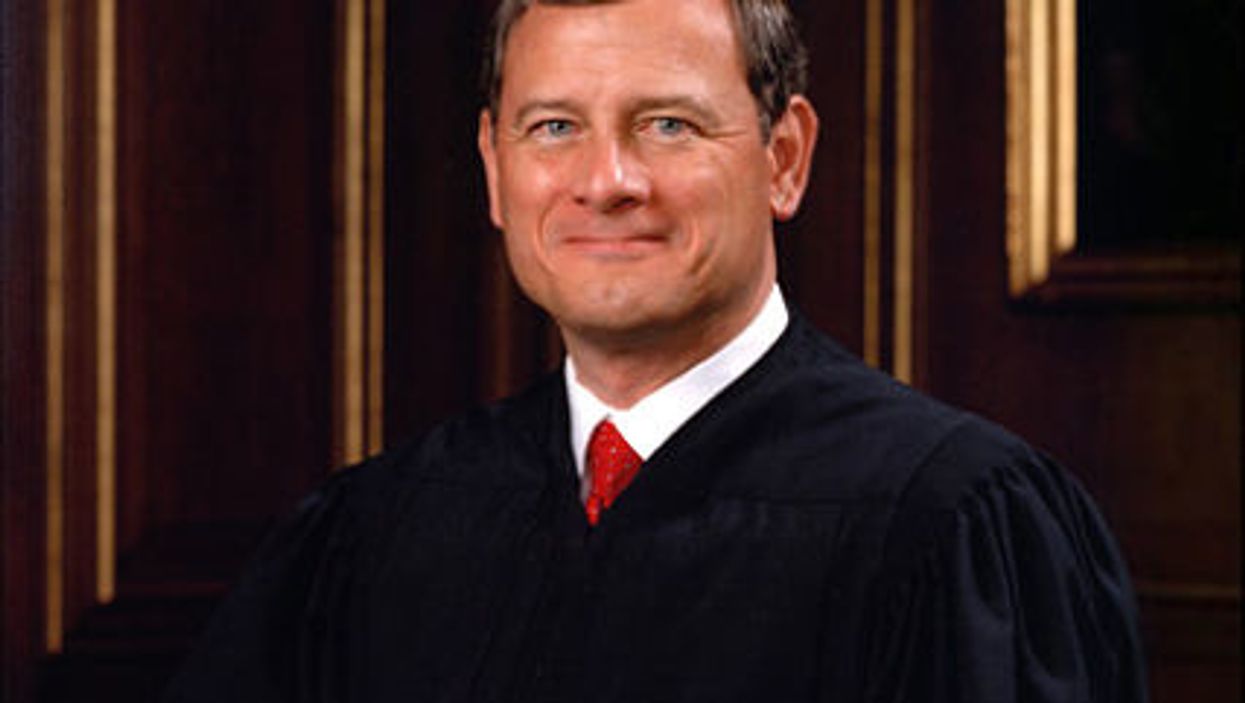Court's Right-Wing Radicals Now Pose Lethal Threat To Democratic Elections

Chief Justice John Roberts
The House Select Committee hearings are swaying political independents and centrists to reject the power-grabbing tactics used by Donald Trump and his Republican enablers to overturn the 2020 presidential election, according to several polls and surveys of battleground state voters released on Thursday, June 30.
“Vast majorities of the American people are paying attention, and they are deeply concerned,” said Leslie Dach, co-chair of Defend Democracy Project, an advocacy group dedicated to the principle that voters determine the outcome of elections. “They believe that a crime has been committed. They want accountability in the courts and at the ballot box. And they hold not just President Trump responsible, but they hold his allies and Republicans responsible for what happened.”
More than 80 percent of all voters have heard or seen “a lot” or “some” about the investigation, pollster Celinda Lake said at the Defend Democracy briefing. Among independents, the bloc that votes for Democrats and Republicans, support for the investigation has grown from 55 percent in May to 73 percent in June, which she called “startling.”
“There’s even greater support for the congressional investigation than there was for the second [Trump] impeachment,” Lake said. Among Republicans, 14 percent supported Trump’s impeachment immediately following the insurrection, while 30 percent are now supporting the wider January 6 investigation.
A different survey probing moderate voters’ reactions to 2020’s election denial for Voting Rights Lab, a D.C. nonprofit tracking state trends, found about half of all voters were still susceptible to the ‘Big Lie,’ with 30 percent saying the 2020 election had been stolen, 7 percent saying that there had been “significant fraud, but it had no impact on the results,” and 11 percent who were “not sure.”
Voters in both major parties were very concerned about American democracy, but moderates were most disturbed by the behaviors showcased in the hearings, where politicians manipulated elections for power, including negating the vote.
“Whether they voted for Trump or Biden, the biggest threats to democracy across all voters was, one, self-serving politicians,”said Tresa Undem, a Washington, D.C. based researcher. “And then [came] this ‘us-versus-them’ mentality… And, at the center of that, there’s no common good. There’s no common goal.”
Enter The Supreme Court
But on the same day that new research showed that swing voters are increasingly rejecting the Trump-led tactics to thwart the popular vote, the Supreme Court announced that it will hear a case this fall where radical Republicans will contend that only a state legislature – not a state’s constitution, nor its supreme court, governor, or election officials – can set voting rules and certify victors.
In other words, in much the same way that Trump and his loyalists tried to overturn 2020’s popular votes, a case that could enshrine a similar hyper-partisan power grab has been welcomed by the Supreme Court. If validated by the court, the ruling could lead some Republican-run legislatures to override a Democratic presidential candidate’s victory in 2024, because a state’s legislature, not its voters, would appoint its presidential electors.
“This case sets up what will be one of the most consequential cases of the next term, and, indeed, what may be one of the most significant, if [not] one of the most destructive cases in American democracy that we will have seen, depending on how things turn out,” said Thomas Wolf, deputy director of the Brennan Center for Justice at NYU School of Law ‘s democracy program, at a June 30 briefing that reviewed the case’s complexity and stakes.
“The super-majority of justices on this new Supreme Court have made clear that they are willing to entertain ideas that have not previously been upheld by the highest court in the land,” Wolf said. “This certainly would be one of them.”
The case, from North Carolina, involves redistricting, and which state authority has the final say over redrawing its electoral boundaries. Its legislature segregated voters to preserve its power, which is one way to manipulate voting. The maps created by the GOP-led legislature were rejected by the state’s high court.
The legal theory pushed by radical Republicans is called the “independent state legislature theory (ISL).” It asserts that no other state branch can interfere in how its elections are run. It cites terse sentences in the U.S. Constitution that say state legislatures set the “times, places and manners” of holding federal elections, and, in another section, that legislators appoint presidential electors.
While the North Carolina case involves gerrymandering, the power grab at its core could affect every stage of voting. During Trump’s post-2020 litigation, where his campaign lost more than 60 suits challenging electoral protocols and results, his legal team repeatedly raised this theory. But it has gained momentum, including statements by four of the nine Supreme Court justices in other rulings that said they would welcome reviewing the ISL theory – or a version of it.
Justices Samuel Alito, Neil Gorsuch and Clarence Thomas supported it, and Brett Kavanaugh said it should be scrutinized before 2024, Princeton University’s Kim Lane Scheppele, who specializes on threats to constitutional governmental, wrote in March. Via email, she said that Chief Justice John Roberts also “has never seen a Republican-leaning voting rights case that he didn’t want to get behind.”
“The Court may well find – as did the Court in Bush v. Gore [in 2000] – that there is no individual right in the Constitution to vote for president or even for electors of the president,” Scheppele said. “As you know, before the Civil War, a number of states used a system in which their state legislatures select the electors. Given the emphasis of the Court on (selective) historical practices [such as its decision banning abortion], they may well find that any system a state legislature creates for selecting electors is fine with them, including cancelling the popular vote altogether – or cancelling it after the fact if the result isn’t ‘clear.’ And in the pure version of the independent state legislature theory, neither governor nor state court can override, limit, or interpret the rules that the legislature passes.”
A 'Nutty' Partisan Fantasy
At the Brennan Center’s briefing, constitutional scholars said that the court would have to construct a convoluted path to validate the theory and gut the historical checks and balances over how elections are run. But after recent rulings banning the right to an abortion, expanding gun rights, empowering prayer in school, and limiting executive branch power to fight climate change, several scholars said the best strategy may be to warn the public about the stakes in the case, its potential for wreaking chaos, and also to ridicule the ISL theory as a partisan fantasy.
“It’s nutty. It’s a deliberate comical misreading of what the text, structure, history, purpose, meaning, and goals of the constitutional provision are,” said Michael Waldman, president of the Brennan Center.
Meanwhile, several voter surveys conducted since the January 6 hearings began have found that the most powerful voting bloc in battleground states – centrists who vote for Republicans or Democrats – increasing are disgusted by Trump’s attempted coup. One of Trump’s tactics was a first cousin, if you will, of the ISL doctrine, where state GOP leaders rejected their state’s popular vote results. Instead, they sent forged Electoral College documents to Washington.
“What is emerging very, very strongly from the hearings is not just that Trump was responsible, but there was a faction of the Republicans, Trump Republicans, who were responsible as well,” Lake said. “This was about overturning the will of the people, overturning elections, and people take that very, very seriously.”...
Steven Rosenfeld is the editor and chief correspondent of Voting Booth, a project of the Independent Media Institute. He has reported for National Public Radio, Marketplace, and Christian Science Monitor Radio, as well as a wide range of progressive publications including Salon, AlterNet, The American Prospect, and many others.
- D'Souza's 'Big Lie' Movie Is So Bad Fox Won't Promote It - National ... ›
- Supreme Court Threatens To Wreak Havoc In Battleground State Elections - National Memo ›
- Why Democrats Should Push A Federal Abortion Rights Statute Now - National Memo ›
- One America News Promotes Election Deniers In Key State Races - National Memo ›
- Oklahoma Backlash Over Trump 'Prayer Video' Mandate In Public Schools - National Memo ›
- Will the Independent State Legislature doctrine literally mean the ... ›
- 'Independent state legislature' theory in spotlight as SCOTUS ... ›
- The independent state legislature theory and more on jurisdiction ... ›
- Supreme Court Should Shut Down Latest Bid to Rewrite Elections ... ›
- Contentious Fringe Legal Theory Could Reshape State Election ... ›
- What is the “Independent State Legislature Doctrine”? | The National ... ›
- The 'Independent State Legislature Theory,' Explained | Brennan ... ›








